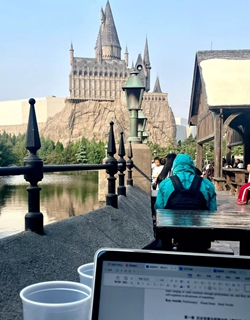
Disney characters pose for photos to welcome visitors, marking the Shanghai Disney Resort' return to full operations, Dec 8, 2022. Photo:Xinhua
What does it feel like to study in "the happiest places on Earth?" Young people who are heading to theme parks, especially Disney resorts and Universal Studios, to study will give you the answer.
On Chinese social media platforms, there are many posts from creators, many of whom hold annual passes, sharing their experiences, tips on finding study-friendly spots, and reflections on this unique approach to study.
Despite certain drawbacks - such as a less quiet environment, limited access to charging outlets, and higher commuting costs, some interviewees described the experience as a joyful blend of learning and leisure.
"These young people choosing to study at theme parks not only seek fresh experiences and want to enhance their quality of life but also prioritize emotional value when it comes to their spending," Zhang Peng, an associate professor at Nanjing Normal University, told the Global Times on Sunday.
"This new approach to studying blends the concept of work-rest balance and reflects their pursuit of productivity and leisure," he added.
Take Liang Shuang, a student from Communication University of China, for example. With her campus just a 30-minute subway ride from Universal Studios Beijing, she often visits the park. For her, studying at the park is an uplifting alternative to the school library. "The atmosphere here is great," Liang said. She often rewards herself with rides after completing her study sessions. "Even if I don't go on rides, just sitting and studying there makes me happy."
Liang has scoped out quiet corners where she can focus without disturbing other visitors. However, she admits that park facilities are not without flaws - finding power outlets can sometimes be challenging.

Photo: Courtesy of Cico
For fourth-year college student Cico in Beijing, Universal Studios provides a perfect environment for tackling her coursework.
"Studying here gives me more motivation and even inspiration," she said. The joy she feels from her surroundings translates into a more fulfilling academic experience.
Over in Shanghai, Coco, another young learner, has embraced Disney as her go-to park. She described the park as her personal sanctuary, ideal for both leisurely strolls and productive work sessions.
"The weather, the greenery and the cheerful visitors around me - it's easy to get into the zone," she shared. Coco often works in outdoor rest areas and indoor cafes at the park, though she acknowledges that theme parks are not ideal for every task - video calls, for example, can be tricky due to the background music.
For professionals like 27-year-old Zhu, Disney is an appealing destination for weekly study or work sessions. She highlighted the park's well-maintained greenery, ample space and reliable amenities. But occasional Wi-Fi hiccups can sometimes be drawbacks.
This trend reveals how young people are redefining the boundaries of traditional learning spaces. "These annual pass holders, who carve out study corners in theme parks, are not just seeking efficiency but also emotional satisfaction. This demonstrates their pursuit of a personalized, high-quality lifestyle and their openness to new ways of balancing work and leisure," Zhang explained.
Still, there are practical considerations. The commute to a theme park is generally more time-consuming and expensive than heading to a library or café. For most participants following this trend, the cost is mitigated by proximity or pre-existing annual passes. For Liang, for example, her campus's location near Universal Studios makes it convenient. She adds that she wouldn't purchase an annual pass solely for study purposes, but having one makes these study visits a welcome bonus.
The author is a reporter with the Global Times. life@globaltimes.com.cn





